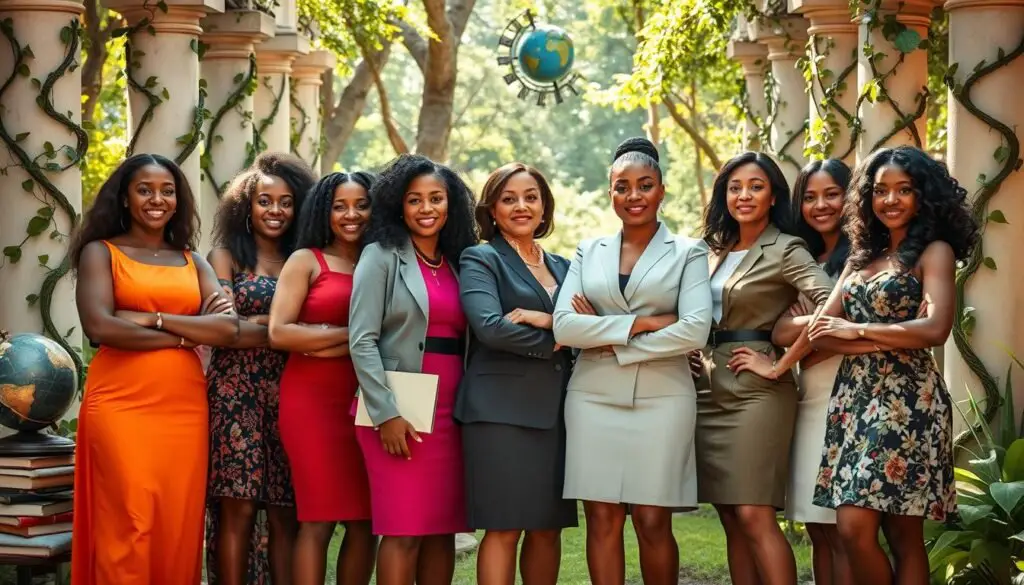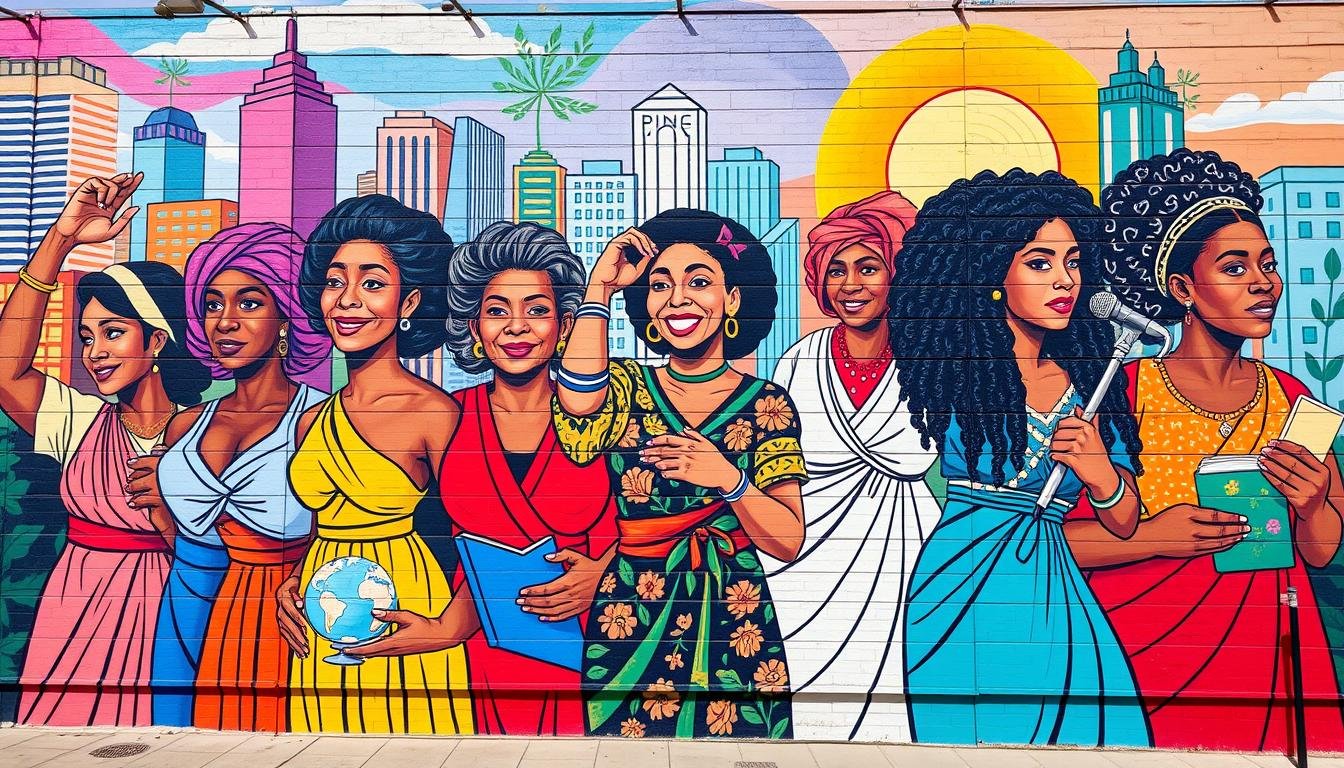Remarkable women have left their mark throughout history. They broke barriers and inspired future generations. Mary Wollstonecraft, Hatshepsut, Elizabeth Blackwell, and Billie Jean King are just a few examples.
These women showed us that leadership is about courage, resilience, and making a difference. Their stories teach us to dream big and challenge the norms. By learning from them, we can become better leaders.
Key Takeaways
- Pioneering women leaders have overcome societal barriers to make lasting contributions in diverse fields.
- Perseverance, vision, and a commitment to social change are hallmarks of female leadership throughout history.
- Lessons from women trailblazers can inspire bravery, boldness, and a dedication to creating a more inclusive and innovative world.
- Women’s leadership is a cornerstone of progress, showcasing the power of diverse perspectives and the transformative potential of inclusive decision-making.
- Studying the lives and legacies of female pioneers can provide invaluable guidance for aspiring leaders of all backgrounds.
Breaking Barriers: Historical Impact of Women Leaders
Women pioneers in leadership have overcome huge obstacles. Their dedication, strength, and creativity have opened doors for others. These trailblazers have not only succeeded in their fields but have also changed the way power is viewed and used.
Early Challenges and Innovations
Women like Sojourner Truth, Grace Hopper, and Rosalind Franklin have changed their industries. Sojourner Truth fought for freedom, Grace Hopper advanced technology, and Rosalind Franklin helped discover DNA’s structure.
Pioneering Spirit Through the Ages
Women leaders have shown their courage in many fields. Golda Meir was Israel’s first female Prime Minister, and Benazir Bhutto was Pakistan’s. Empress Dowager Cixi and Cleopatra also left lasting impacts.
Legacy of First Achievements
The legacies of these women leaders inspire many. Queen Victoria and others like Catherine the Great and Queen Liliuokalani have shown what women can do. Their stories prove the power of women’s leadership.

Queen Elizabeth I: Leadership Through Golden Age Prosperity
Queen Elizabeth I ruled from 1533 to 1603. She is seen as one of the greatest leaders in history. Her 44-year reign was peaceful, prosperous, and saw a cultural bloom, known as the Golden Age.
Elizabeth I worked hard to better the lives of the English people. She made smart decisions and never married, earning her the nickname “Virgin Queen.”
Her reign was filled with achievements. She ended a war with France, solved religious issues, and defeated the Spanish Armada. Her leadership made her a legendary monarch, known for her political wisdom and fair rule.
Elizabeth I also left a mark on fashion and culture. She wore elaborate costumes, jewelry, and wigs to show her youth and purity. Her style influenced men’s fashion, starting a new era of style.
The Tudor dynasty, under Elizabeth I, brought the Renaissance and Reformation to England. Her reign showed women could hold power, a rare sight back then.
Elizabeth I’s leadership in the Golden Age is a great example of female leadership role models and inspirational leadership lessons from women pioneers in history.

Eleanor Roosevelt: Shaping Modern Leadership Philosophy
Eleanor Roosevelt’s life changed from being shy and insecure to becoming a global leader. She used her power to push for social change. Her work has made a lasting impact on the world.
From Personal Growth to Global Impact
Eleanor Roosevelt was born in 1884 in New York City. She faced early challenges but became a force for good. She started volunteering at the Rivington Street Settlement House in 1902.
Her activism in the 1920s connected her with key pacifist feminists. This strengthened her commitment to civil rights and women’s empowerment.
Advocating for Social Change
Eleanor Roosevelt was dedicated to fighting for social justice. In 1935, she said feminism’s main goal was to give women equal opportunities and rights. She joined groups like the National Consumers’ League to support wage-earning women.
Creating Lasting Legacy
Eleanor Roosevelt’s influence went beyond being the First Lady. In 1946, she became a delegate to the United Nations General Assembly. She was the first chair of the UN Commission on Human Rights.
Under her, the Universal Declaration of Human Rights was created. It recognized the rights of men and women worldwide.
“The future belongs to those who believe in the beauty of their dreams.”
Eleanor Roosevelt’s leadership and dedication to change still inspire women leaders today. Her legacy continues to influence people across the globe.

Katherine Graham: Revolutionary Corporate Leadership
Katherine Graham is a shining star among women trailblazers. She became the first female CEO of a Fortune 500 company. After her husband’s death, she took over The Washington Post. She led the paper through the Watergate Scandal and other big controversies.
Graham was known for her drive for excellence. She was not afraid to challenge old ways or break rules. She worked hard to make the newsroom more equal for women, opening doors for others.
Her dedication to truth and integrity won her a Pulitzer Prize. Her memoir is a testament to her leadership and vision.
“The thing women have yet to learn is nobody gives you power. You just take it.”
Graham’s impact went beyond the media world. She showed how to lead with strength and integrity. Her example inspired many, proving that leadership is not just for men.

Inspirational Leadership Lessons from Women Pioneers
Women leaders have shown us important lessons. They lead with authenticity, empathy, and resilience. They change the game by using their unique strengths and pushing for equality.
Core Principles of Pioneer Leadership
Women pioneers lead with authenticity, empathy, and vision. They value relationships and stay strong in tough times. Their bold moves bring about real change.
Transformative Decision-Making
Women pioneers have made big decisions that changed the game. Kiran Mazumdar-Shaw entered the tough Indian biotech world. Rosalind Brewer talked about trust and safety. Their choices have made a big difference.
Building Lasting Impact
Women pioneers have left a lasting mark. They empower others and push for big changes. Reshma Saujani and Nthabiseng Mosia are great examples. They inspire and challenge the status quo.

“Leadership is about making others better as a result of your presence and making sure that impact lasts in your absence.” – Sheryl Sandberg
The lessons from women pioneers are inspiring. They show us the power of diverse views and bold actions. Their work will help create a better future for all.
Mary Wollstonecraft: Foundations of Feminist Leadership
Mary Wollstonecraft was born in 1759 in London, England. She is known as the “first feminist” or the “mother of feminism.” Her famous book, “A Vindication of the Rights of Woman,” is key to the women’s equality movement. Her life and work still inspire women pioneers in leadership and inspirational women leaders everywhere.
After her father lost their wealth, Wollstonecraft had to work to support herself. This showed her strength and determination. Her experiences made her believe in the need for women’s education and social equality, which she fought for in her writings.
“A Vindication of the Rights of Woman,” published in 1792, is a seminal work that challenged the societal norms and double standards of the time, paving the way for future feminist thinkers and activists.
Wollstonecraft’s impact went beyond her writing. She was part of a radical group in London, working with famous people like William Godwin, Thomas Paine, and William Blake. Her daughter, Mary Wollstonecraft Shelley, became famous for writing “Frankenstein,” adding to the family’s literary and advocacy legacy.
Even though she died at 38 from childbirth complications, Wollstonecraft’s ideas and writings kept shaping the women’s rights movement. They inspired leaders like Elizabeth Cady Stanton and Margaret Fuller in the mid-19th century.

Mary Wollstonecraft’s life and work show the power of women pioneers in leadership and inspirational women leaders. They fight for gender equality and social progress. Her legacy still inspires today’s feminists and advocates, showing how one visionary can change the world.
Hatshepsut: Redefining Power Dynamics
Hatshepsut was a groundbreaking female leader who ruled ancient Egypt from 1508 BCE to 1458 BCE. She started as Queen Regent but soon became a full Pharaoh. This move broke gender barriers and opened doors for women who broke barriers in leadership.
Innovation in Leadership Approach
Hatshepsut focused on trade, arts, and construction, not just war. Her leadership style emphasized economic and cultural growth. This set a new standard for pioneering female leadership stories.
Cultural Impact and Legacy
After her death, people tried to erase Hatshepsut’s legacy. But, the discovery of hieroglyphics at Deir el-Bari in 1822 brought her back into history. Her reign made Egypt stronger and her leadership style still inspires today.
“Hatshepsut’s reign was a testament to her vision, determination, and the ability to challenge traditional power structures. Her legacy continues to shape our understanding of women who broke barriers in leadership.”

Hatshepsut’s journey to power and her impact on ancient Egypt are inspiring. Her innovative leadership and the challenges she faced still motivate leaders today. They aim to redefine power and inspire change.
Elizabeth Blackwell: Pioneering Medical Leadership
Elizabeth Blackwell is a legend in medical history. She was the first woman in America to get a medical degree in 1849. This achievement opened doors for many women to follow in her path.
Blackwell faced many obstacles but never gave up. She applied to 17 medical schools before getting into Geneva Medical College in New York. Despite the opposition, she graduated at the top of her class, earning respect from her peers.
After medical school, finding a job was tough because of her gender. But she didn’t let that stop her. In 1857, she opened her own practice in New York City. She also started the New York Infirmary for Women and Children, a place for women and children to get medical care and for aspiring doctors to learn.
Blackwell’s impact went beyond her practice. During the Civil War, she trained nurses for the front lines. She also wrote books like “Medicine as a Profession for Women,” pushing for women’s roles in medicine.
Elizabeth Blackwell’s legacy as a women trailblazer and inspirational leadership lesson is huge. Her determination, innovative spirit, and drive to empower women in medicine have changed healthcare forever.

“I am convinced that the future belongs to the women. They ought to be prepared to carry on the work of the world, to become strong, true, and noble women. The time is coming when the world will need the women, and they should be ready for the call.”- Elizabeth Blackwell
| Key Milestones in Elizabeth Blackwell’s Career | Year |
|---|---|
| Became the first woman in America to earn a medical degree | 1849 |
| Opened the New York Infirmary for Women and Children | 1857 |
| Opened a medical college for women in New York City | 1868 |
| Became a professor of gynecology at the London School of Medicine for Women | 1875 |
Modern Trailblazers: Contemporary Women Leaders
In today’s fast-changing world of business and tech, inspiring women leaders are leading the way. They are making big strides in medicine and changing how companies work. These women pioneers in leadership are showing us what it means to be a true inspirational women leader.
Innovation in Today’s Business World
Dr. Samantha DuFlo is changing the medical field with her research and care for patients. Alena Uzhneya, the founder of a successful global business, shows us how to adapt and overcome. Missy Kelly, an entrepreneur, has created products that make our lives better.
Technology and Social Impact
Aang Lakey uses tech to help people grow and change their lives. Carolina Lopez is making supply chains better and more fair. These inspirational women leaders are not just innovating. They are also making a big difference in society.
These women leaders stand for being true, strong, and caring. Their stories show us the power of women pioneers in leadership. They inspire others to lead and make a difference.
“The most common way people give up their power is by thinking they don’t have any.” – Alice Walker

Strategies for Authentic Leadership Development
Authentic leadership development helps people grow by becoming more self-aware and true to themselves. It’s about leading with empathy and being open. Eleanor Roosevelt showed us the value of learning, trusting oneself, and staying true to values.
Mindfulness is a key strategy. It helps leaders face challenges with clarity and kindness. Through reflection, they understand their decisions better and how they affect their teams.
Getting different views is also vital. Leaders who listen to various opinions create spaces where everyone can grow. This makes teams more inclusive and supportive.
| Authentic Leadership Principles | Strategies for Development |
|---|---|
| Self-Awareness |
|
| Empathy and Transparency |
|
| Commitment to Continuous Learning |
|
By using these strategies, leaders can grow. They become resilient, visionary, and empathetic. This helps them make a positive impact in their work and communities.
“Leadership is not about titles, positions, or flowcharts. It is about one life influencing another.” – John C. Maxwell
Embracing Unique Leadership Styles
Authentic leadership means being true to oneself, even in tough environments. Serin Silva showed how being different can lead to success. She took Williams-Sonoma Inc to nearly $1 billion in sales.
By mixing resilience with vulnerability, leaders can build inclusive teams. They speak slowly, make eye contact, and pause to think. This approach encourages innovation and teamwork.
Overcoming Adversity: Lessons in Resilience
Women pioneers have shown incredible resilience in the face of challenges. Their stories teach us how to grow and innovate from adversity. These tales offer leadership wisdom to those who aspire to break barriers.
Building Mental Fortitude
Amberley Snyder, the only paralyzed professional barrel racer in the U.S., is a great example. After a severe rodeo accident, she wrote a children’s book in just two days. Over the next 18 months, she bravely returned to the arena, proving the strength of determination and a positive attitude.
Snyder stresses the value of a strong support system and choosing happiness. She also believes in sharing stories to inspire others. Her journey shows us the power of resilience, optimism, and celebrating small victories in overcoming life’s hurdles.
Turning Challenges into Opportunities
Mary Kay Ash, the founder of Mary Kay Cosmetics, faced early career gender discrimination. Yet, she used her life savings to start her company. Ash’s leadership and focus on people helped Mary Kay Cosmetics grow globally.
Katherine Johnson, known as the “human computer” at NASA, also faced many barriers. She believed in lifelong learning and self-improvement. Her work paved the way for women like Jeanette Epps to become astronauts and mathematicians.
These women’s stories highlight the resilience and adaptability of women who broke barriers in leadership. Their leadership wisdom encourages us to face challenges, build mental strength, and turn obstacles into opportunities.
Creating Inclusive Leadership Environments
Inspirational women leaders have always stressed the need for inclusive spaces. They believe in diversity and innovation. Leaders like Aang Lakey push for inclusive leadership that tackles disparities with kindness and understanding.
To build inclusive leadership, we must promote psychological safety and celebrate different views. We must also work to remove gender biases. These leaders are changing company cultures and leading to fairer futures.
Studies show the big difference inclusive leaders make. 84% of people say they feel more driven by inclusive leaders. 83% feel more loyal to their team and company. 81% say they work better and are more productive.
Women like Isabella Thissen show how inclusive leadership can change things. She has worked in startups and big companies. Isabella always promotes inclusive practices that help teams succeed.
“Inclusive leadership is not just a moral imperative – it’s a strategic advantage. By fostering an environment where everyone can thrive, we unlock unparalleled innovation and unlock the full potential of our people.” – Aang Lakey, Founder and CEO of Increasing Consciousness
As we face big challenges, the lessons from inspirational women leaders are clear. The way to real progress is through inclusive spaces where everyone’s voice is heard and valued.
| Statistic | Percentage |
|---|---|
| Respondents who felt more motivated by their inclusive leader | 84% |
| Respondents who had increased loyalty to their team, leader, and organization | 83% |
| Respondents who reported improved performance and productivity | 81% |
| Respondents who were motivated to go the extra mile | 81% |
Conclusion
Women pioneers in leadership, from Queen Elizabeth I to modern trailblazers, teach us a lot. They show us the strength of being true to oneself, staying strong, and thinking big. Their stories help us learn how to break barriers and lead change.
These women’s legacies inspire us to lead with inclusivity and a commitment to values. They show us the power of learning and growing. Their work helps us build a fairer and more innovative world.
Elizabeth Blackwell, Hatshepsut, and Mary Wollstonecraft are just a few examples. Their stories teach us about determination, empathy, and staying true to our values. They show us how to break down walls and redefine power.
Today, their lessons are more important than ever. They teach us to be resilient, visionary, and committed to change. By following their lead, we can create a more inclusive and transformative world.
The path to a better future is guided by these women’s leadership. Their influence will keep shaping the leaders of tomorrow. Let’s learn from their examples and strive for a more equitable world.
FAQ
What are some of the key leadership lessons we can learn from pioneering women throughout history?
Women leaders have shown us the power of being true to oneself, showing empathy, and being resilient. They teach us to use our unique strengths and work together to achieve great things. They also remind us to fight for fairness and equality to make a lasting difference.
How did early women leaders like Queen Elizabeth I and Eleanor Roosevelt overcome significant challenges?
Queen Elizabeth I ended a war with France and defeated the Spanish Armada during her 44-year reign. It was a time known as the Golden Age. Eleanor Roosevelt, on the other hand, grew from a shy child to become a global advocate for human rights.
What leadership strategies did pioneering women like Katherine Graham employ to succeed in male-dominated fields?
Katherine Graham became the first female CEO of a Fortune 500 company. She fought for equality at The Washington Post and led it through the Watergate Scandal. Her approach was to aim for excellence, no matter what others thought.
How did early feminists like Mary Wollstonecraft pave the way for future generations of women leaders?
Mary Wollstonecraft is known as the “first feminist” or “mother of feminism.” She wrote “A Vindication for the Rights of Women,” a key feminist text. Her life shows the value of following your own path, even when faced with obstacles and unfair expectations.
What leadership lessons can we learn from pioneering women in ancient history, such as Hatshepsut?
Hatshepsut, the Pharaoh of ancient Egypt, changed how leaders rose to power. She focused on trade, arts, and construction, not war. Her reign saw Egypt’s power and influence grow, despite efforts to erase her legacy after her death.
How are contemporary women leaders making significant impacts in various fields today?
Women like Dr. Samantha DuFlo and Alena Uzhneya are innovating in health and business. Missy Kelly, Aang Lakey, and Carolina Lopez are making waves in non-slip products, coaching, and logistics. They lead with authenticity, resilience, and empathy, driving change and growth.
What strategies can aspiring leaders use to cultivate authentic leadership development?
Authentic leadership means knowing yourself, using your strengths, and leading with empathy. It involves mindfulness, seeking diverse views, and creating inclusive spaces for growth.
How have women pioneers demonstrated remarkable resilience in the face of adversity?
Women like Eleanor Roosevelt and Katherine Graham have shown incredible resilience. They overcame personal doubts, navigated tough times, and kept going through setbacks. Their stories teach us about mental strength and turning challenges into opportunities for growth.
What are the key strategies women leaders employ to create more inclusive leadership environments?
Women leaders like Aang Lakey focus on intersectional leadership, addressing disparities with compassion. They promote psychological safety, celebrate diverse views, and work to eliminate gender biases. Their efforts are changing organizational cultures and creating more equitable futures.

One Reply to “Inspirational leadership lessons from women pioneers”